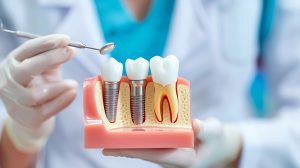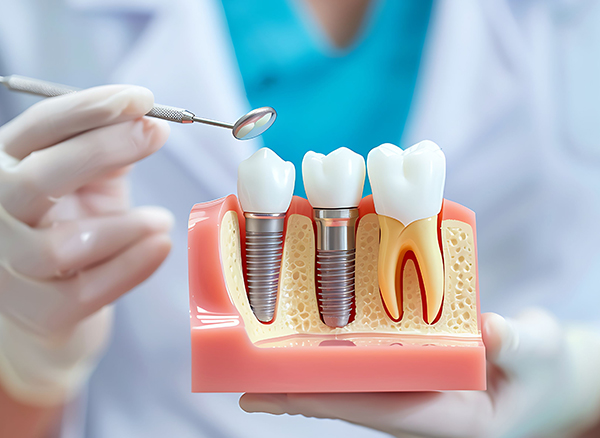Everything You Need to Know About Dental Implants
Dental implants are a game-changer in modern dentistry, offering a top-notch solution for missing teeth. Here’s a friendly guide to help you understand what dental implants are, their benefits, their drawbacks, the procedure, and how to take care of them.

What Are Dental Implants?
Dental implants are like super-strong artificial tooth roots made of titanium, a material that’s friendly to your body. They get inserted into your jawbone and act as a solid base for attaching new teeth—like crowns, bridges, or dentures. Over time, the implant bonds with your bone in a process called osseointegration, making it a stable and long-lasting anchor for your new smile.
Why Are Dental Implants Great?
- High durability: Implants are incredibly durable and can last a lifetime with the right care. Titanium is tough and won’t decay, so your new teeth stay strong for years.
- Natural appearance: Implants are designed to look and feel just like your natural teeth. With custom-made crowns, they blend right in with the rest of your smile.
- Oral health benefits: Unlike traditional bridges, implants don’t need to alter your neighboring teeth. They also help keep your jawbone healthy and prevent bone loss, which can happen when you lose teeth.
- Enhanced functionality: Implants restore your full chewing power, so you can enjoy all your favorite foods without any discomfort or limitations from removable dentures.
What Are the Drawbacks of Dental Implants?
While dental implants offer numerous advantages, they also come with potential drawbacks and considerations that are important to be aware of before deciding if they are the right choice for you.
- Cost: Dental implants can be more expensive compared to other tooth replacement options. This is due to the surgical procedure and the high-quality materials used.
- Surgical Procedure: Getting implants requires surgery, which may involve a recovery period and potential discomfort. There’s also a risk of complications, such as infection or implant failure.
- Healing Time: The process of osseointegration can take several months, during which time you may need temporary restorations. This extended timeline can be a drawback for some patients.
- Not Suitable for Everyone: Some people may not be ideal candidates for implants if they have insufficient jawbone density or certain health conditions that affect healing.

What’s the Procedure of Dental Implants?
- Initial Visit: Your first appointment will include a detailed exam with X-rays or 3D scans to plan the best placement for your implants.
- Placing the Implant: During a quick procedure with local anesthesia, a small cut is made in your gum, and the implant is placed into your jawbone. Afterward, the gum is closed up, and the healing starts.
- Healing Time: Over the next few months, the implant will naturally fuse with your bone. You might get a temporary tooth while this happens.
- Adding the Crown: Once everything has healed, a small connector piece called an abutment is added to the implant. Finally, a custom crown is attached, giving you a beautiful, functional new tooth.
How to Care for Your Dental Implants
Taking care of your implants is key to making them last. Make sure to brush and floss regularly, just like with your natural teeth. Regular dental check-ups will help keep an eye on your implants and catch any issues early.
In Conclusion
Dental implants are a fantastic option for replacing missing teeth, offering both great looks and impressive functionality. If you’re thinking about implants, contact us today to see if they’re the right choice for you !

